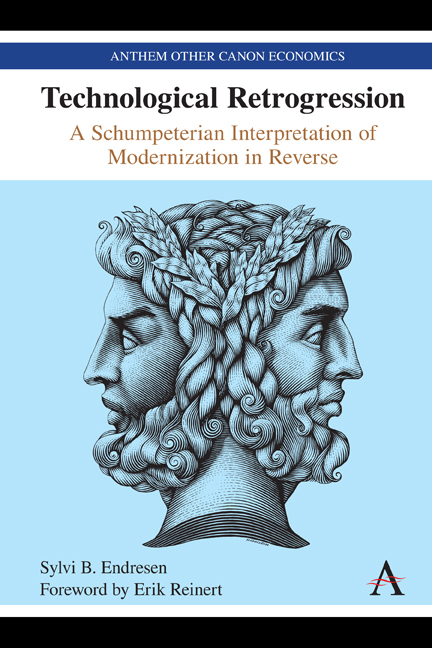Book contents
- Frontmatter
- Dedication
- Contents
- List of Figures
- Foreword
- Acknowledgements
- Preface: The Book within This Book
- Introduction: The Concept of Technological Retrogression
- 1 Challenging Linearity and Irreversibility
- 2 Perspectives on Technological Heterogeneity
- 3 Production Systems and Work Histories
- 4 Empirical Evidence of Technological Retrogression: The Sri Lankan Case
- 5 Empirical Evidence of Technological Retrogression: The Malaysian Case
- 6 A Theory of Technological Retrogression
- References
- Index
Foreword
Published online by Cambridge University Press: 17 June 2021
- Frontmatter
- Dedication
- Contents
- List of Figures
- Foreword
- Acknowledgements
- Preface: The Book within This Book
- Introduction: The Concept of Technological Retrogression
- 1 Challenging Linearity and Irreversibility
- 2 Perspectives on Technological Heterogeneity
- 3 Production Systems and Work Histories
- 4 Empirical Evidence of Technological Retrogression: The Sri Lankan Case
- 5 Empirical Evidence of Technological Retrogression: The Malaysian Case
- 6 A Theory of Technological Retrogression
- References
- Index
Summary
Sylvi Endresen's book raises key issues that were once high on the agenda of important economists who are considered forefathers of modern theory. She shows extreme, but entirely logical, real consequences of diminishing marginal returns. Even though he did not refer to this term, diminishing returns underlies the pessimism in Reverend Malthus’ 1798 book An Essay on the Principles of Population. Malthus argued that population grows geometrically while food production increases arithmetically, resulting in a population outgrowing its food supply. Famous for his 1817 Principles of Economics, David Ricardo explained that as more land is cultivated, farmers would have to start using less productive land: the geographical extension of production would cause diminishing returns as less productive land was put into use. Malthus and Ricardo's ideas about limited food production stem from the same diminishing returns Sylvi Endresen analyses in the present book.
In 1848 John Stuart Mill gave this same factor even more importance. Under the heading ‘On the Law of the Increase of Production from Land’, he discusses the ‘limiting principle’: that ‘doubling labor does not double production’. Mill complains that this ‘limiting principle’ is not sufficiently considered, writing,
I apprehend this to be not only an error, but the most serious one, to be found in the whole field of political economy. The question is more important and fundamental than any other; it involves the whole subject of the causes of poverty; […] and unless this matter be thoroughly understood, it is to no purpose proceeding any further in our inquiry.
Diminishing returns made economics into a ‘dismal science’.
Endresen brings the arguments of Mill and Ricardo one important step further. In the absence of alternative labour markets, diminishing returns – for example, in fisheries – will lead not only to diminishing income to the workers but also to technological retrogression. Fishing fleets that once had used sailing boats had been motorized as the fishermen could afford outboard engines.
With fish stocks being depleted, these fishermen could no longer afford outboard engines and gasoline. Over the years the art of sailing had been unlearned, so the fishermen went from outboard engines to rowing boats. This is the kind of technological retrogression this book is about.
- Type
- Chapter
- Information
- Technological RetrogressionA Schumpeterian Interpretation of Modernization in Reverse, pp. xi - xivPublisher: Anthem PressPrint publication year: 2021



